Displaying items by tag: Mount Blanca
Little Bear Peak: A Slippery Proposition
What an action-packed trip this was! From off-roading one of Colorado's most difficult 4x4 trails to witnessing a full-scale Search and Rescue operation! As if climbing one of Colorado's most challenging 14ers wasn't enough!
To start off, here is a break-down of relevant numbers from this adventure up Little Bear Peak:
Peak summited:
Little Bear Peak: 14,037 ft. (ranked 44th in Colorado)
Total elevation gain: 2,360 ft.
Total distance hiked: 2.54 miles
Total time hiking: Approx. 5 hours
Photos taken: 252
Search and Rescue operations witnessed: 1
Little Bear Peak sits impressively next to Blanca Peak in the Sangre de Cristo Mountains of Colorado and is considered one of the most dangerous and perilous mountains in Colorado due to a section near the top called the Hourglass and the Bowling Alley. In fact, just this year, a climber named Kevin Hayne perished on Little Bear from falling at the Hourglass section. A full report of those events can be found here. For a semi-comprehensive (not regularly updated) list of all accidents on Little Bear, check out John Kirk's site.
Having backpacked the long, steep road from the base of Blanca Peak last year to climb Blanca Peak and Ellingwood Point, I was not looking forward to another slog up the road to climb Little Bear. Fortunately, my college roommate and great friend, David Deramo, was back in the state from his long 2 year stay in Japan. Dave owns one of the most awesome Jeep Cherokees I've ever seen. Dave purchased the Jeep when we were in college in 1999 and has put work into it each year since. It went from a stock 1989 Jeep to an awesome rock-crawling machine over the course of many years. Dave has put a lot of work and time into his Jeep, and I was eager to see what it could do. Dave agreed early in the year to drive up the road with me and attempt to climb Little Bear.
Dave drove down from his home in Winter Park with his Jeep on a borrowed trailer, towed by a borrowed Ford half-ton pickup on Friday, August 6th and stayed the night at my place in Colorado Springs. We woke up at a reasonable time and made the drive over La Veta pass and met up with his friend from Durango, Lance. Lance owns 4x4 & More in Durango, Colorado and specializes in custom 4x4 jobs. His own Jeep, another older Jeep Cherokee, does not look like it belongs on the insane Blanca Peak trail; however, Lance keeps his Jeep looking stock but has some nasty tricks up his sleeve, including air suspension that adjusts using switches in his cab. Lance knows his stuff!
When we arrived at the start of the road and began unloading Dave's Jeep from the trailer, a couple of Search and Rescue (SAR) team-members began to assemble. Apparently someone had an accident on Ellingwood Point earlier in the day. Learning about a SAR mission did not do much to instill confidence in me for our trip up Little Bear.
The drive up the road was fun. Dave's Jeep really performed well. He runs a 5.5 inch lift with 35" ProComp XTerrain tires with ARB lockers and tons of other upgrades. For those not familiar with the road, it is truly one of the most insane roads I've seen. The road itself consists of really rocky terrain with several rock crawling obstacles known as Jaws 1, 2, and 3. Dave made Jaws 1 look like a bump in the road.
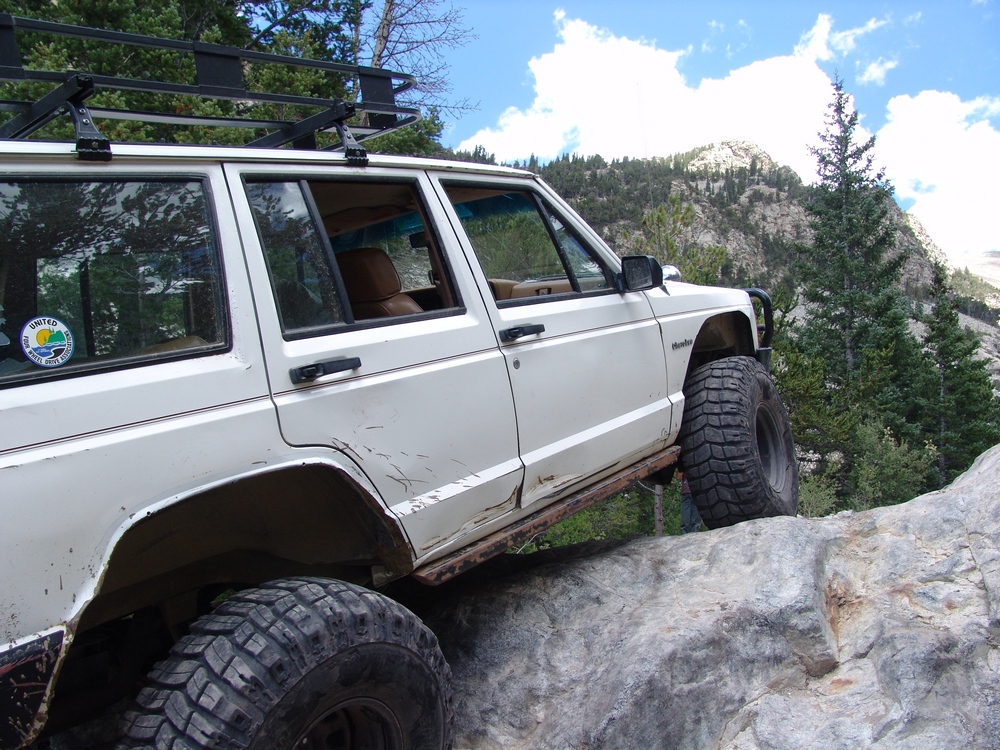
Jaws 1.
Jaws 2 is somewhat scarier, due to its off-camber feel and the considerable risk for tumbling off the side of the mountain. Dave needed a couple of attempts, but also made Jaws 2 look pretty easy. Lance's seemingly unfit Jeep also did great over Jaws 2, much to my surprise. Lance's Jeep is such a sleeper - it looks completely incapable of doing these obstacles, but the tricks he can pull make him just able to make it over the problems.
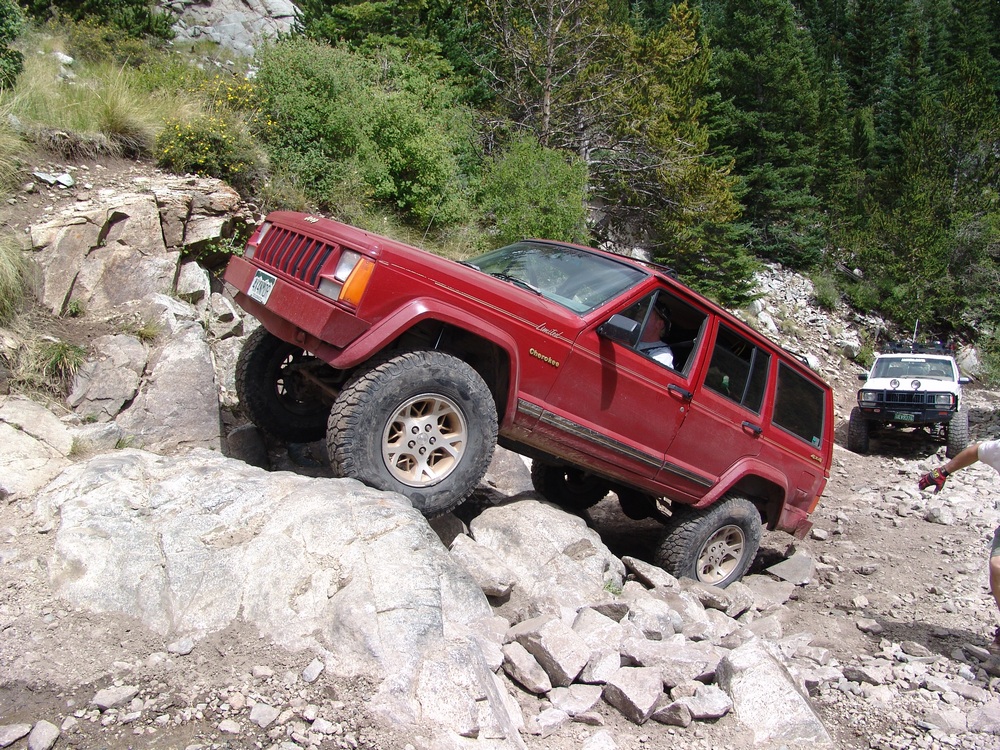
Lance makes it over Jaws 2 in his stock-looking Jeep Cherokee. Lance is a total off-roading master.
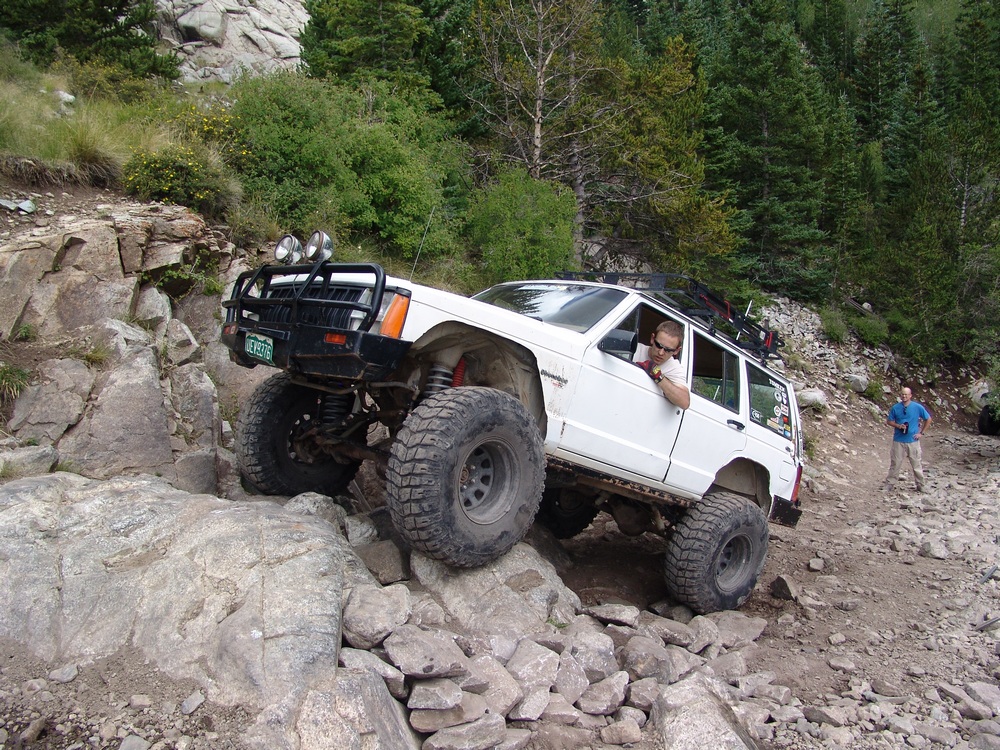
Dave heads up Jaws 2.
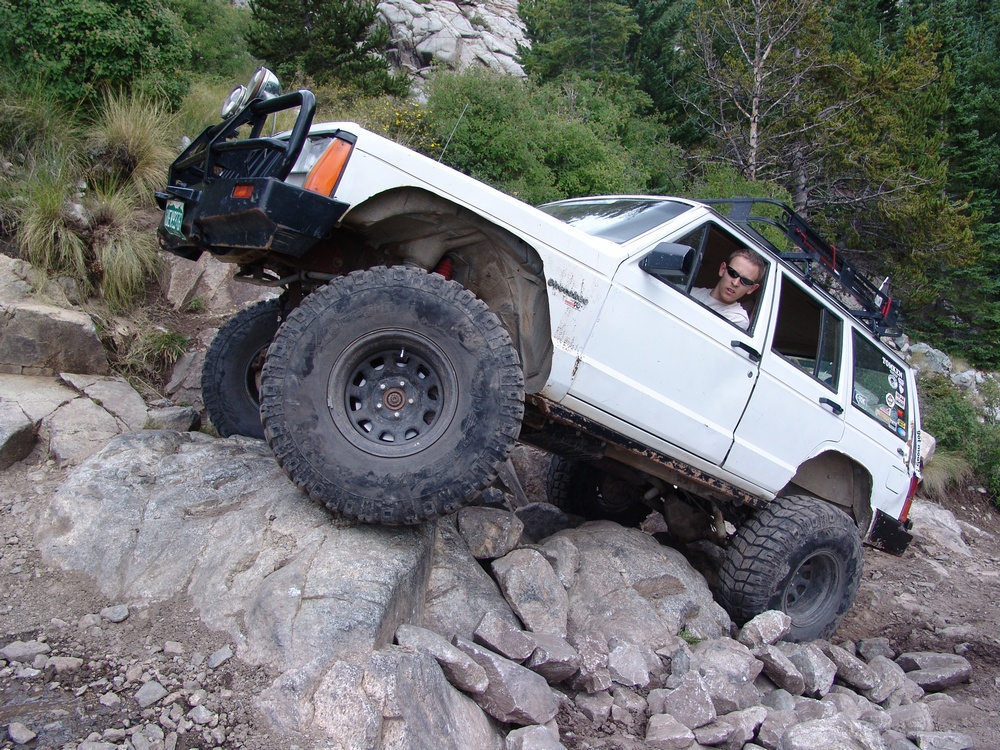
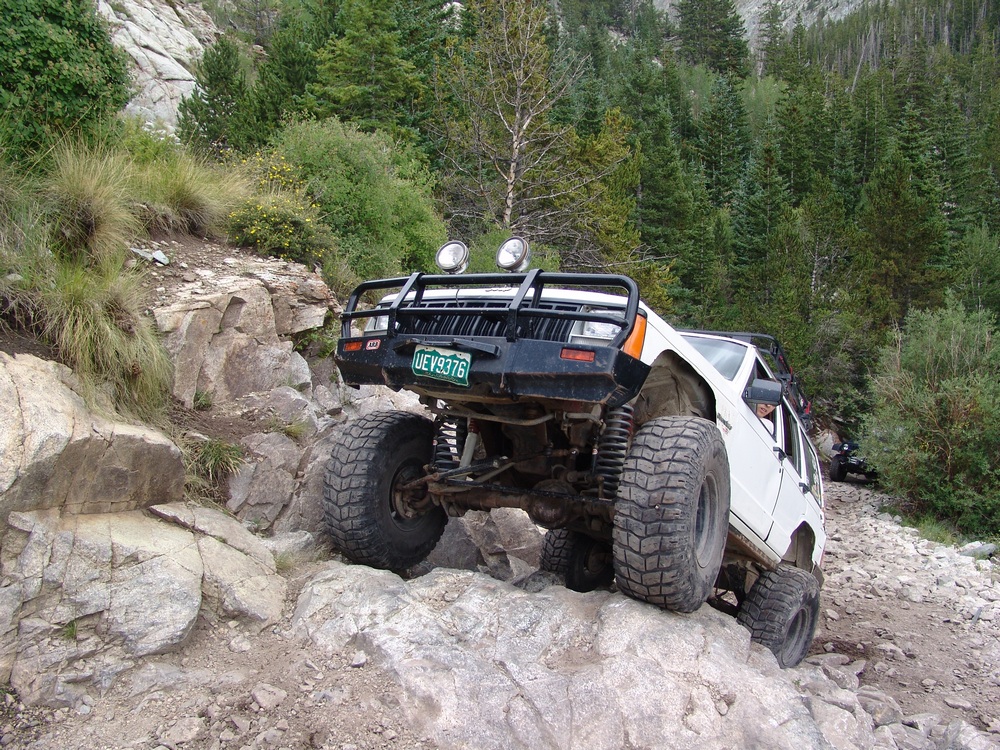
Jaws 3 is a little different than the other two obstacles, having a trickier line than the other two. Most consider Jaws 3 to be the hardest obstacle.
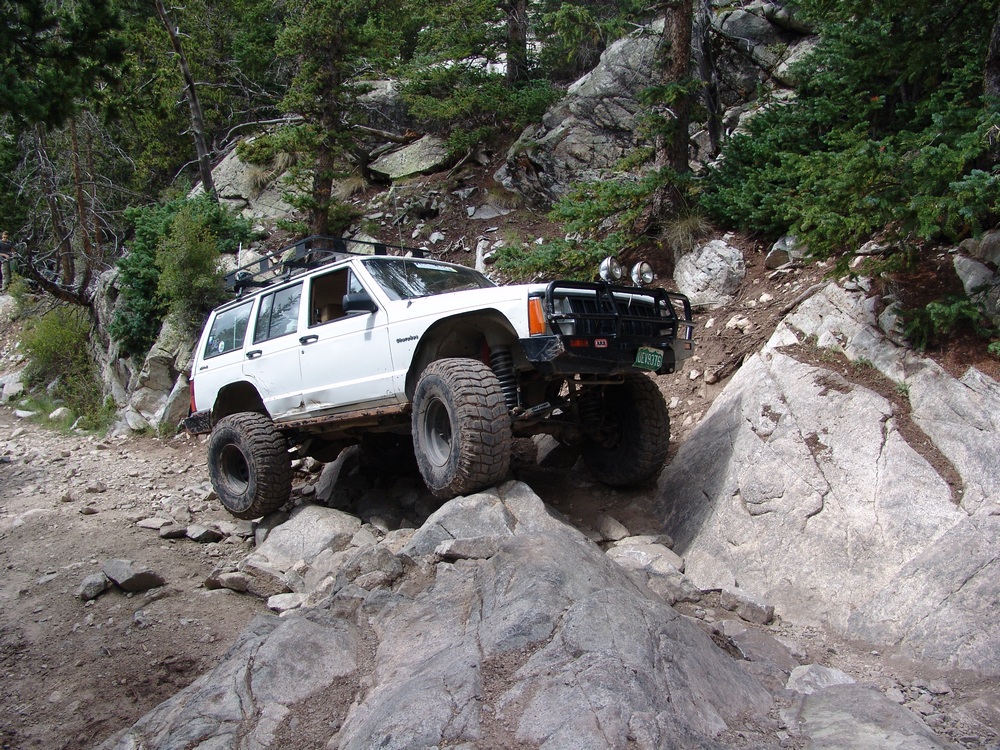
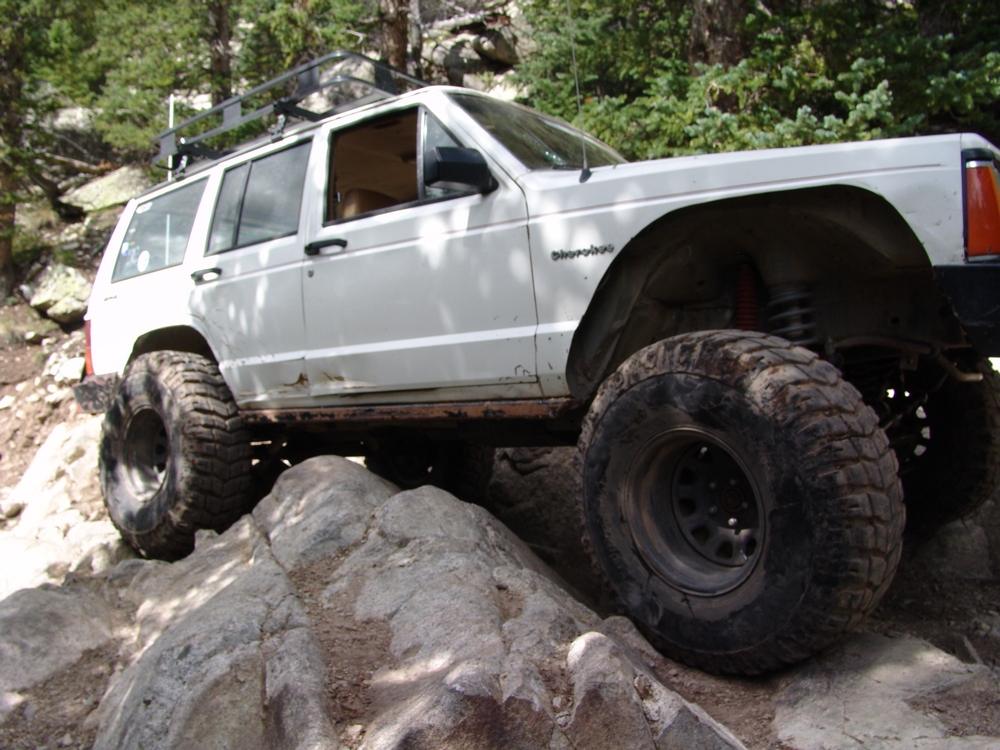
Once over Jaws 3, we were at Lake Como. Lake Como had many 4x4 vehicles parked at it and many campers lined its shores. We aimed for the south-eastern shore to look for camping and enjoyed the views of Little Bear Peak.
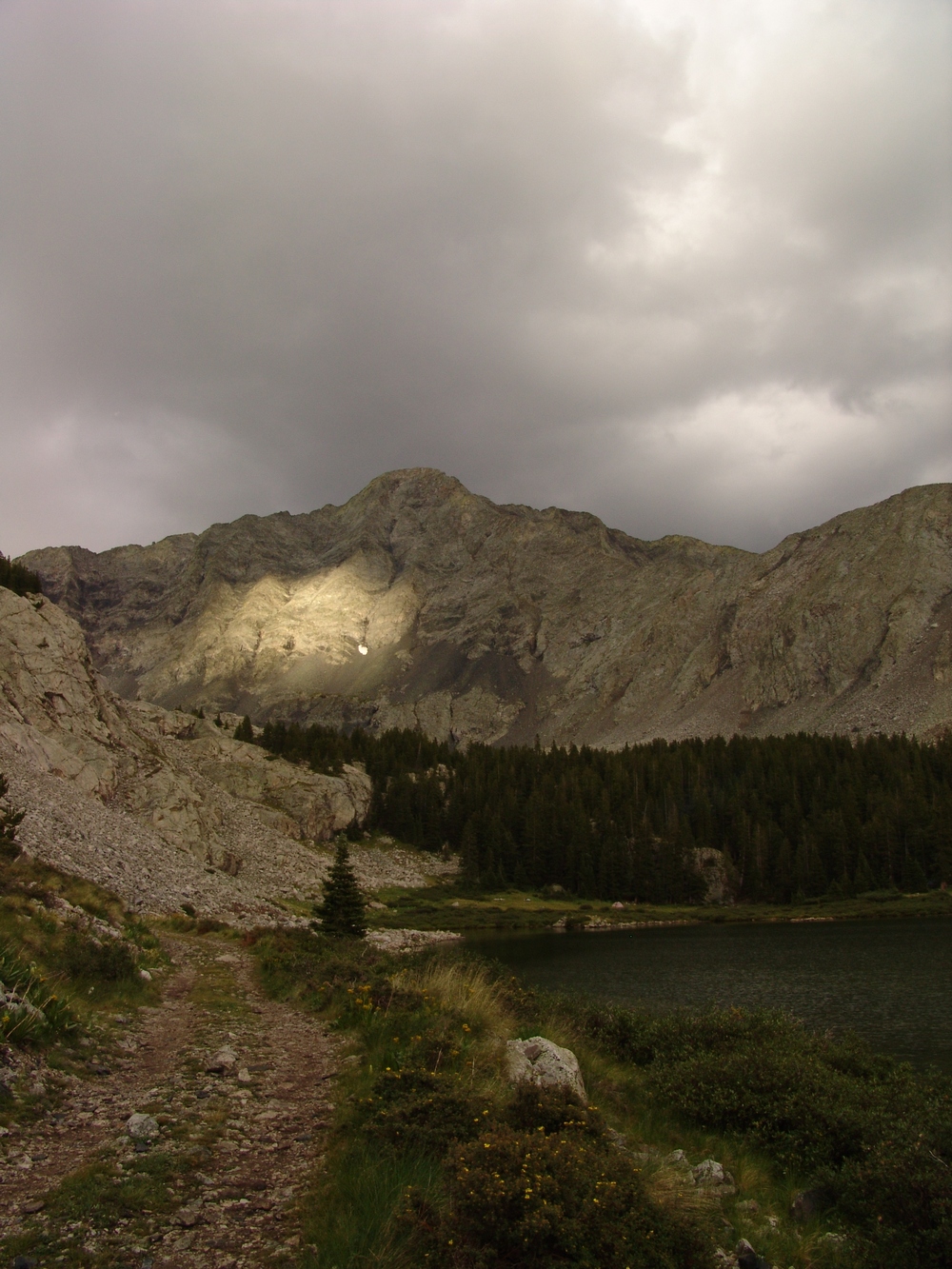
A spotlight shines on Little Bear Peak
We found a great campsite at the far end of the lake and unpacked our gear and made camp. A couple of guys in a Jeep Rubicon also joined us at our camp site. They were also planning on climbing Little Bear Peak, so it was a natural fit. Once our camp was made, we all drove up the road to see if we could complete the final obstacle. It was no problem for our group and we easily made it to the end of the road past Blue Lake. As soon as we arrived, the weather turned nasty, with hail and rain pounding the area. A couple of SAR team members, George and Stefan, approached Dave and I and asked us if we could give them a ride down to Lake Como. George and Stefan were really friendly guys and conveyed the SAR situation to us. A woman with Epilepsy had suffered a seizure and later dislocated her shoulder from a fall. Her injuries were severe enough to merit SAR extraction due to her pain. The entire story can be found on the link above or in the trip report posted by someone involved. It really is a fascinating tale that many mountaineers can learn from.
Here are the lessons I personally learned from the SAR incident: 1) Be sure to find out if your hiking partner(s) have a medical condition. If they do, learn about how it afflicts them and how to treat it. Additionally, make sure your group agrees on the rules of engagement - how you will handle an emergency. These are important things to consider before hiking with others, especially strangers. 2) If you have a medical condition - please disclose it to your fellow hikers before they agree to hike with you. Fully disclosing this to your partners is only fair and offers them the opportunity to learn more and to decide if they want to take on the risk of accompanying you on the hike. If your medical condition worsens while climbing, please turn-around and head back to camp before the situation worsens and SAR is called.
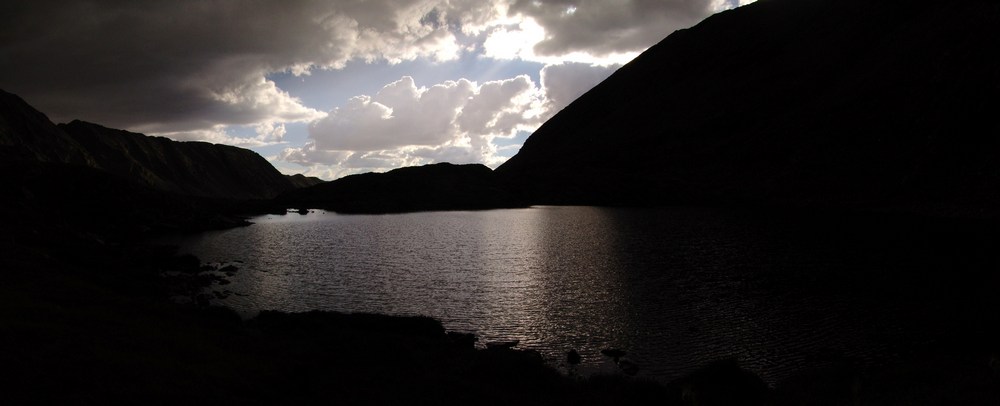
Blue Lake before the storm

Blue Lake during the storm
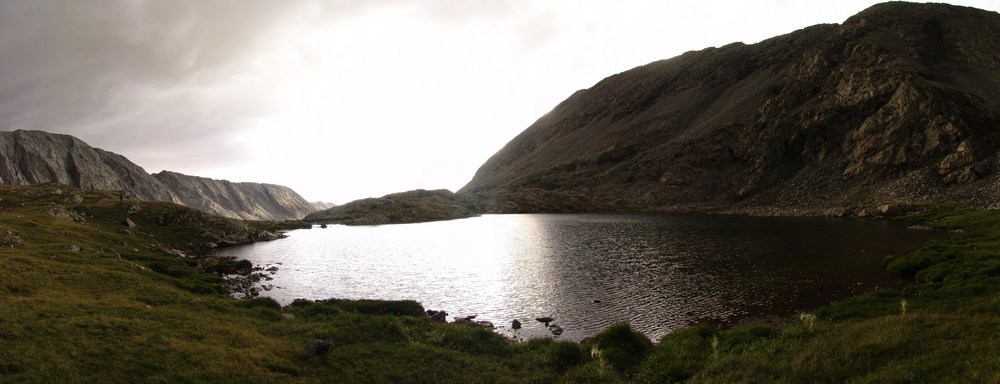
Blue Lake after the storm

The waterfall seen above Blue Lake, just before the headwall of Blanca Peak.
Dave and I returned to camp and ate dinner. Our group spent some time around a camp-fire, exchanging stories with some hikers that had came down from helping the SAR team. Dave and I eventually crashed and set the alarm for 4 AM. Given that there was a lot of lightning and rain that night, we wanted to get an early start on Little Bear.
We woke up at 4:30 after mashing the snooze button a few times and set away for the Little Bear turn-off at the top of the hill above Lake Como. We scrambled the boulders and made our way up the very steep gully leading to Little Bear's ridge. Caution should be taken in this gully, as the rock is loose. We made quick work of the gully and stopped to take some photos.
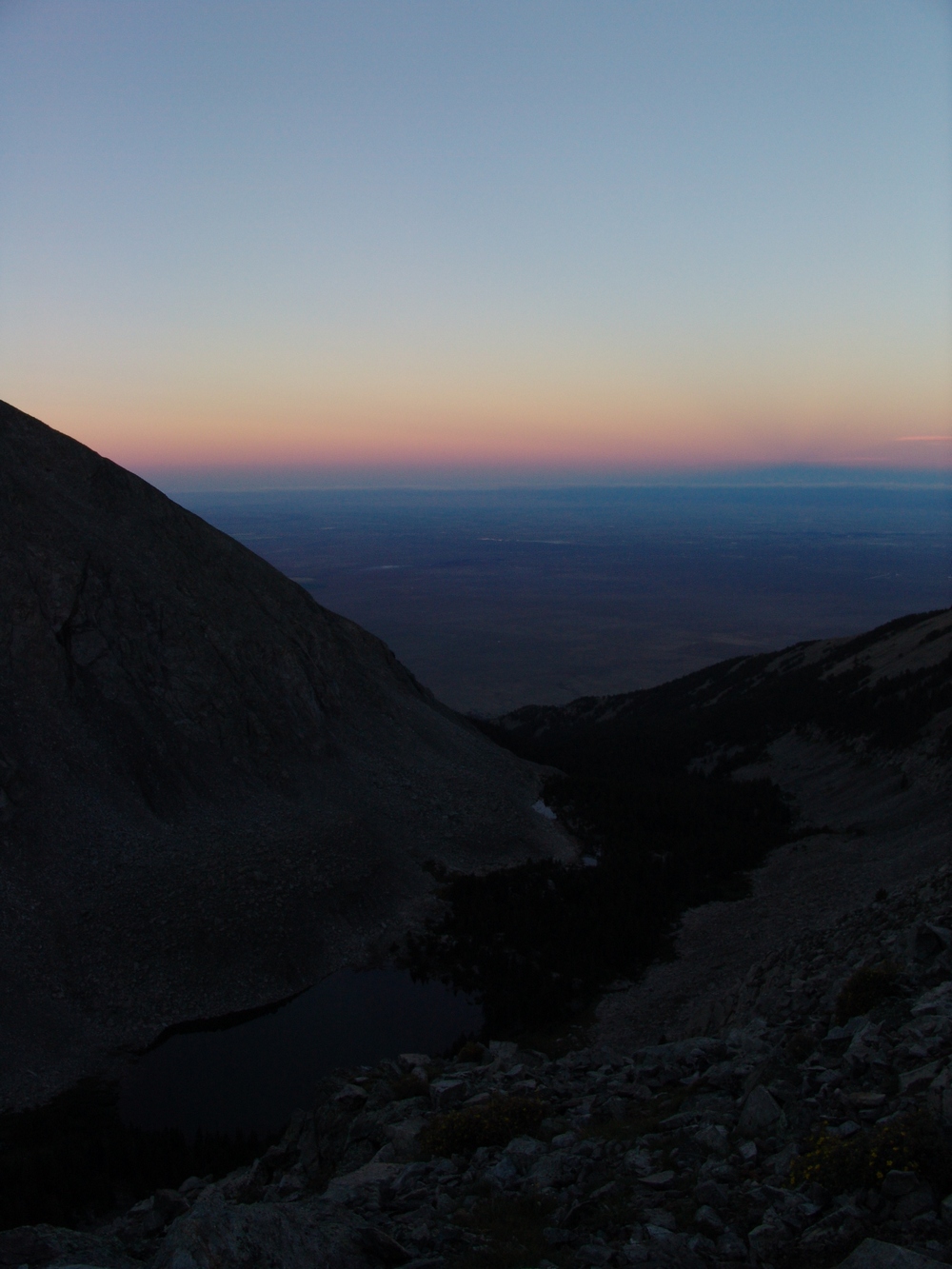
Looking west towards Alamosa.
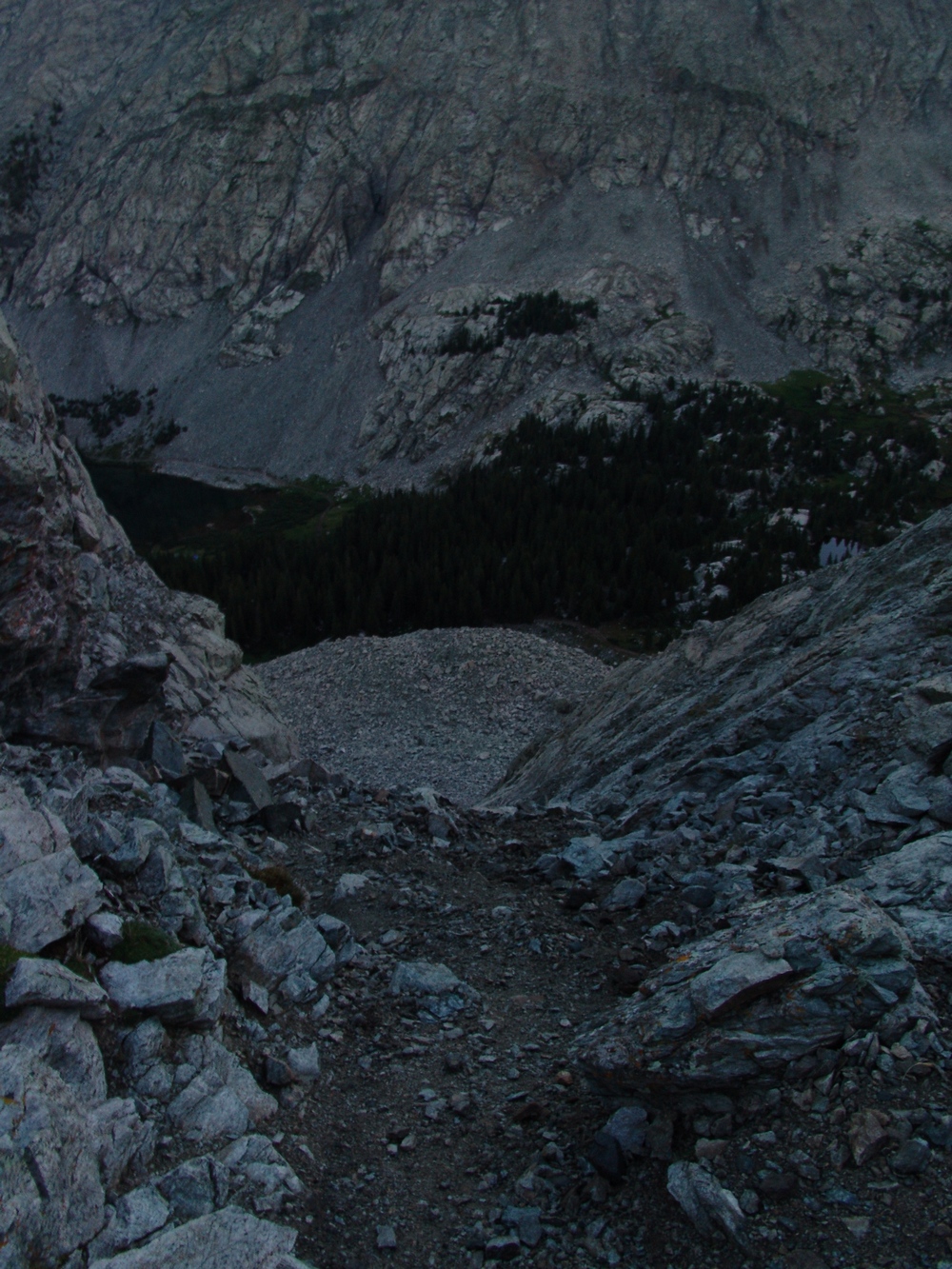
The steep gully leading to Little Bear's ridge.
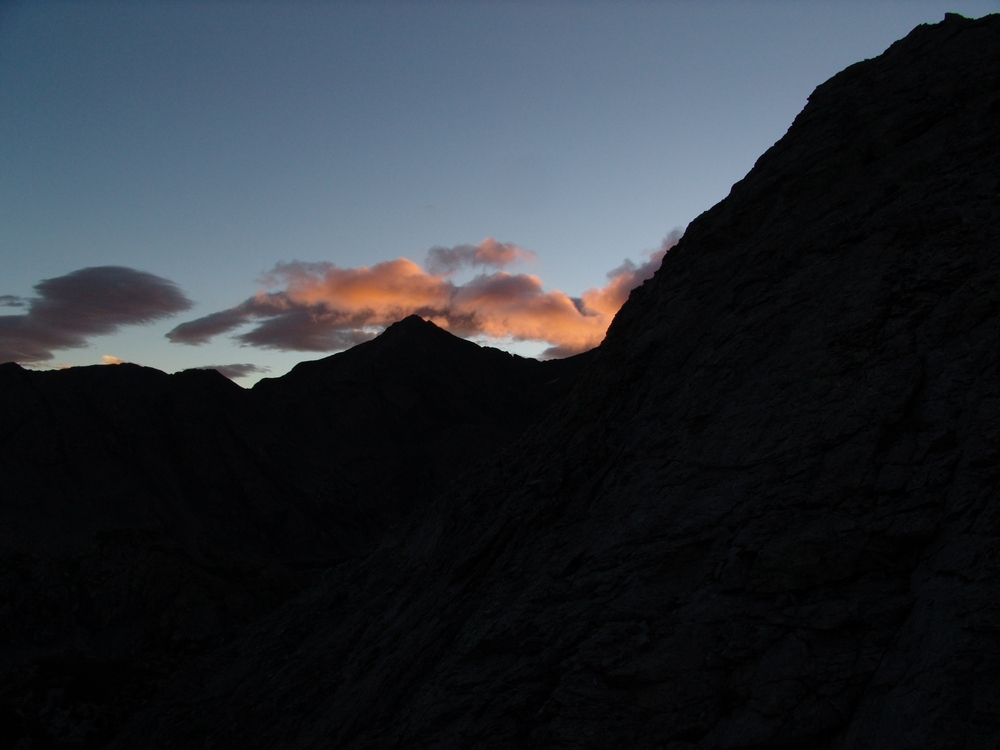
Ellingwood Point at sunrise
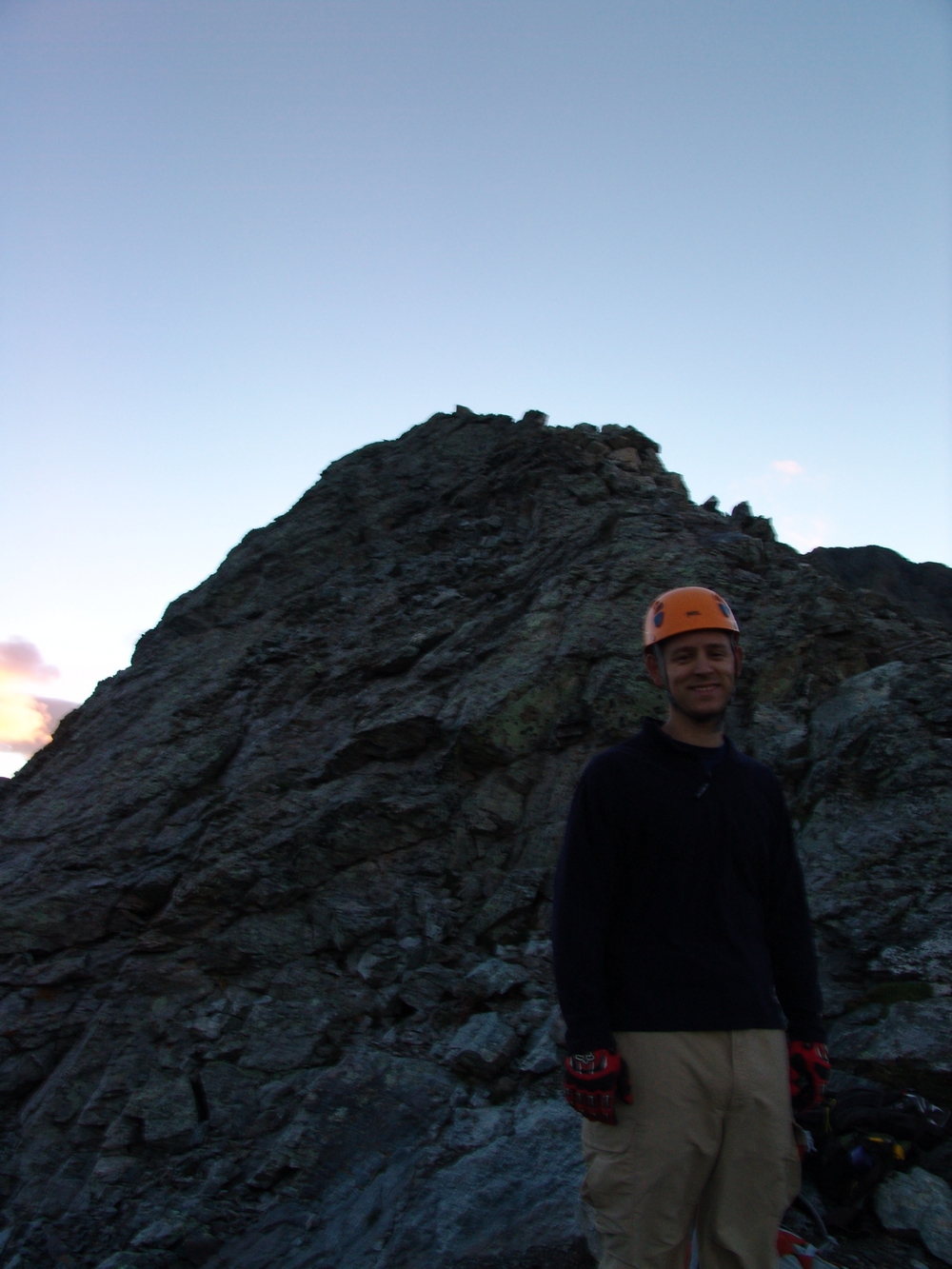
Dave at the top of the gully.
We made our way across the mountainside, just below the ridge towards Little Bear. The trail is faint but well-marked by cairns and is easy terrain. We reached about the half-way mark from the gully and Little Bear and gained our first great views of Little Bear.
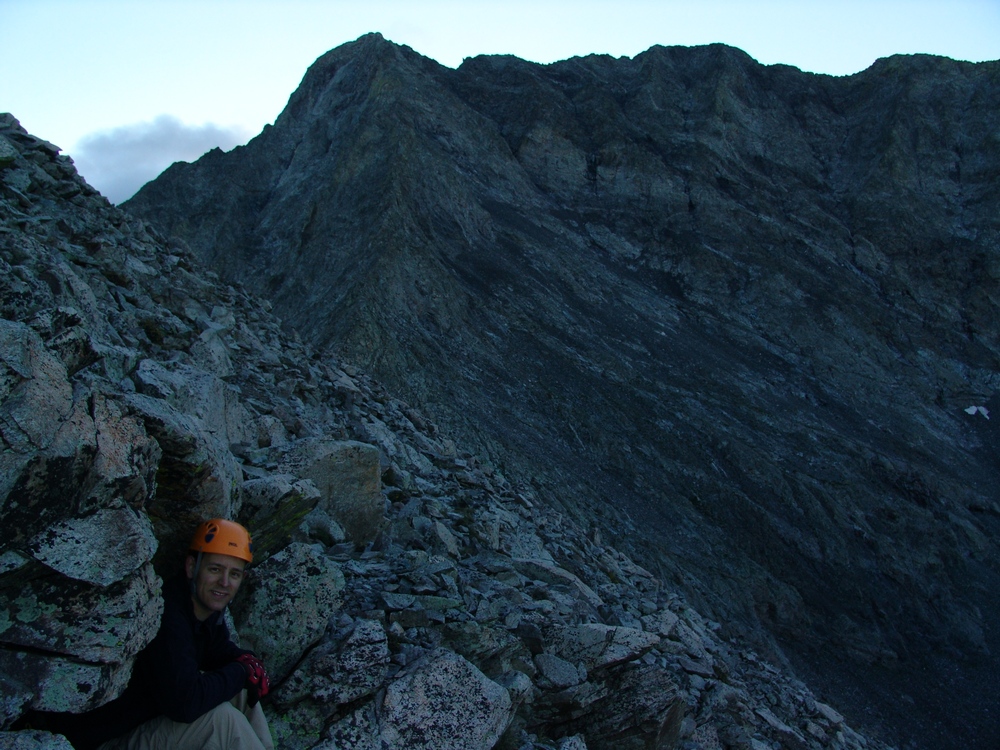
Dave takes shelter with Little Bear's impressive face behind him.
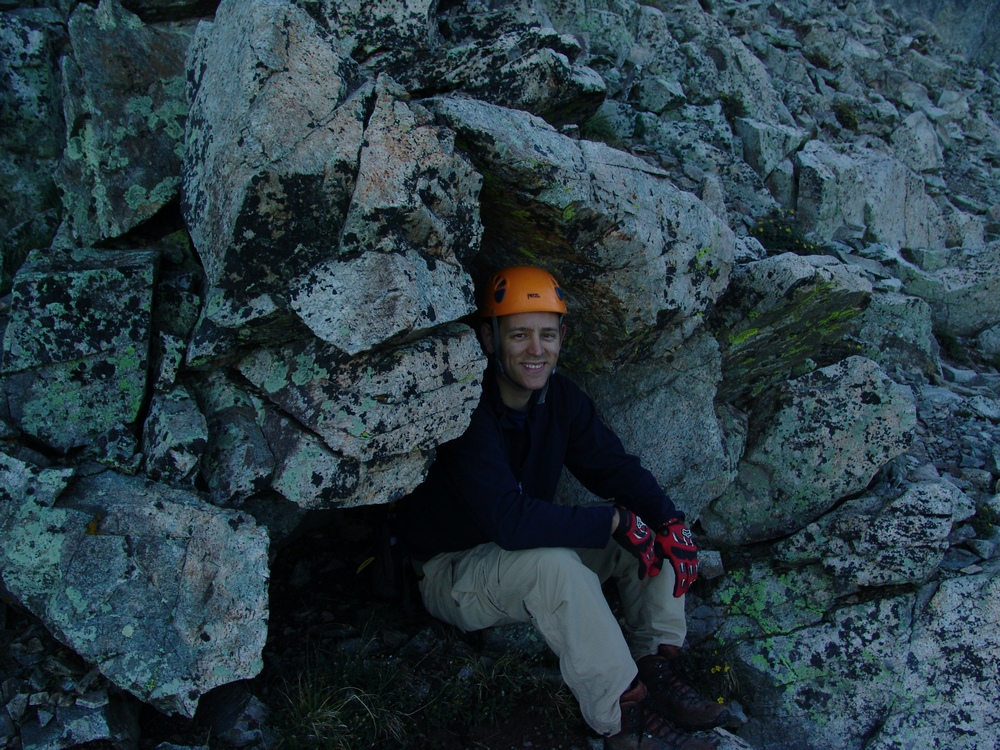
Dave's Cave.
We quickly made our way to the base of Little Bear and were greeted by the famous Hourglass. The Hourglass is the deadliest section of this climb, for obvious reasons. Water runs down the center of this narrow and steep gully, forcing climbers higher to the left in order to get past the start of the gully. The whole section above the Hourglass is referred to as "The Bowling Alley," since rocks kicked down from above are all funnelled inwards, creating a dangerous situation for those climbing up. Since we wanted to avoid rockfall from above, we were glad we got up early and were the first to reach the Hourglass. Since it had rained a lot the night before, the rocks everywhere in the Hourglass were wet. We were able to find some patches of dry rock and slowly and meticulously made our way up the gully.
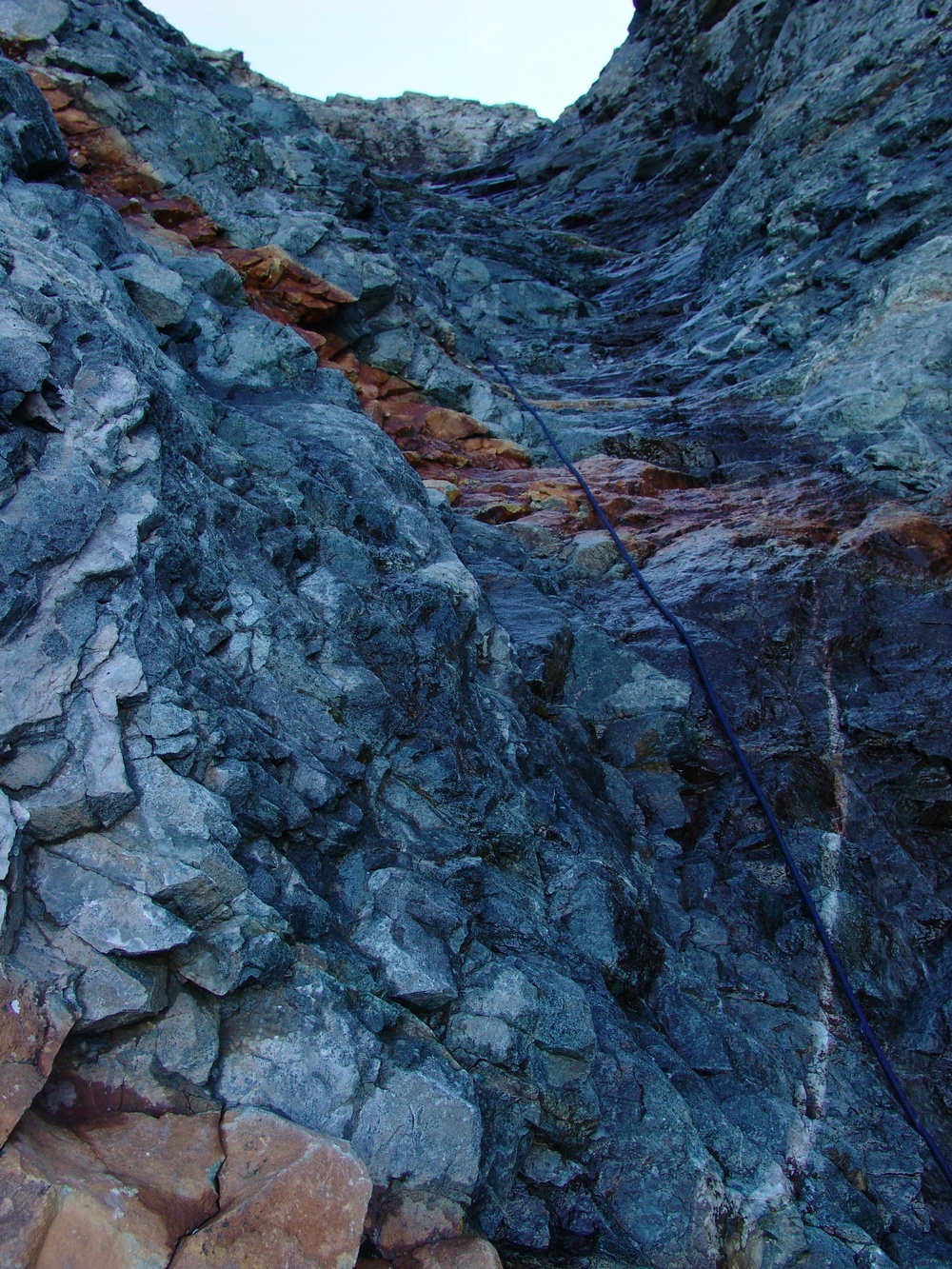
The Hourglass.
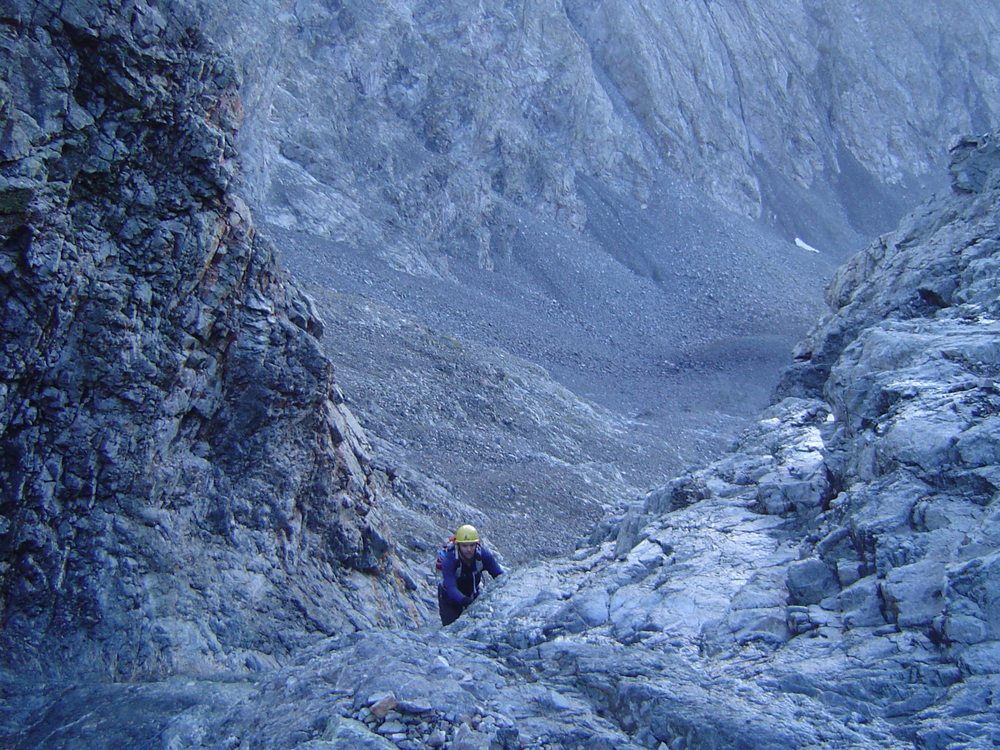
Matt Payne ascends the Hourglass. Note the steepness and wetness of the rock. Handhold and foothold selection was paramount to success.
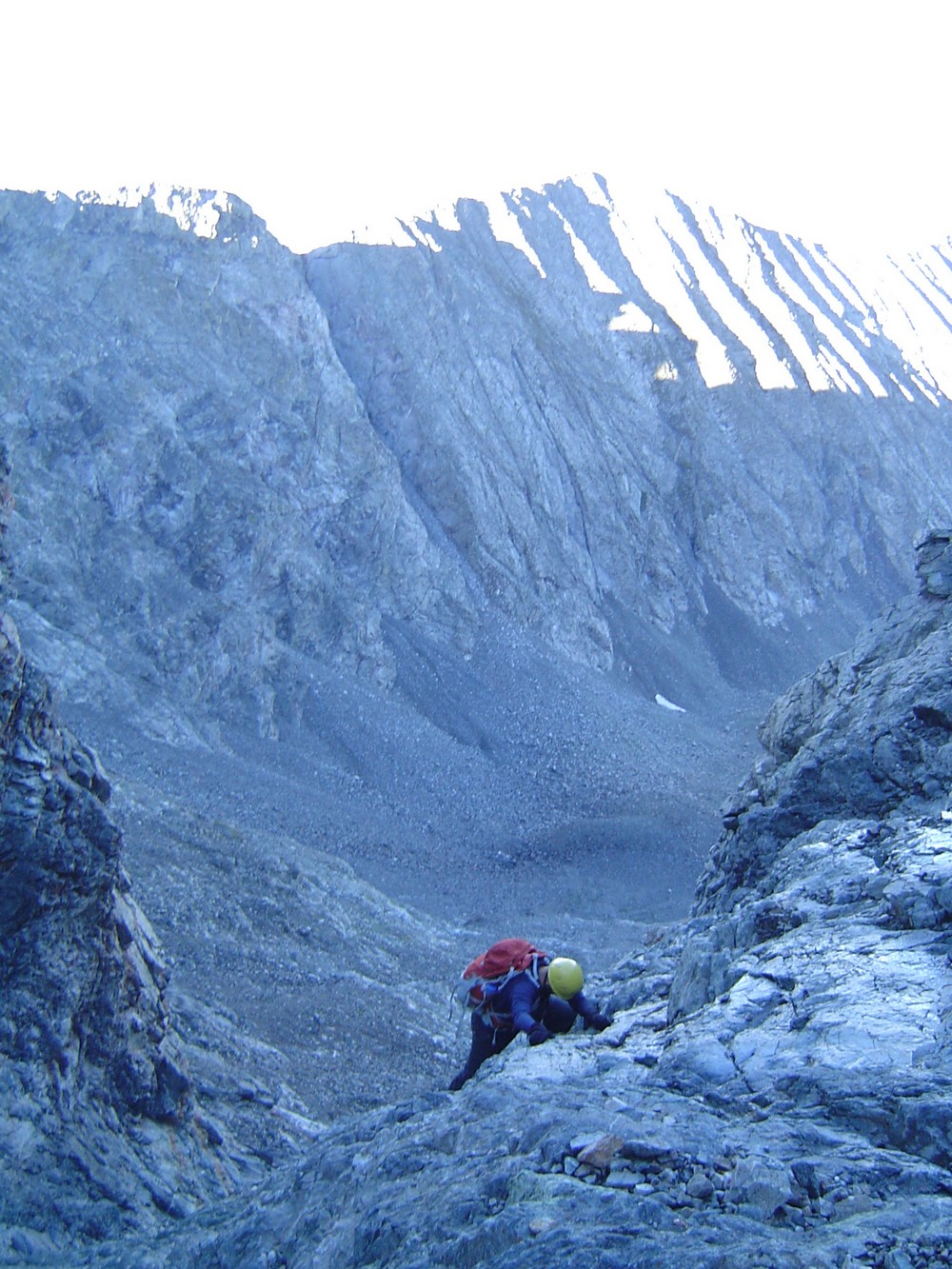
A fall here would have been fatal. Take caution!
The first 10 - 20 feet of the Hourglass are scary. Holds are minimal and the rock is wet. Extra special caution should be taken here and only those comfortable climbing class 4 and class 5 terrain should continue. If you're afraid of heights, this is not for you. Routefinding in the Hourglass was fairly difficult. The rocks were all wet and dirt was loose, making our climb upwards a slow and calculated process. We were eventually able to find some cairns to the left of the Hourglass and make our way up to the summit. The summit itself provided insane views of Blanca Peak, Ellingwood Point, the Spanish Peaks, Mount Lindsey, and the rest of the Sangre de Cristo Mountains.
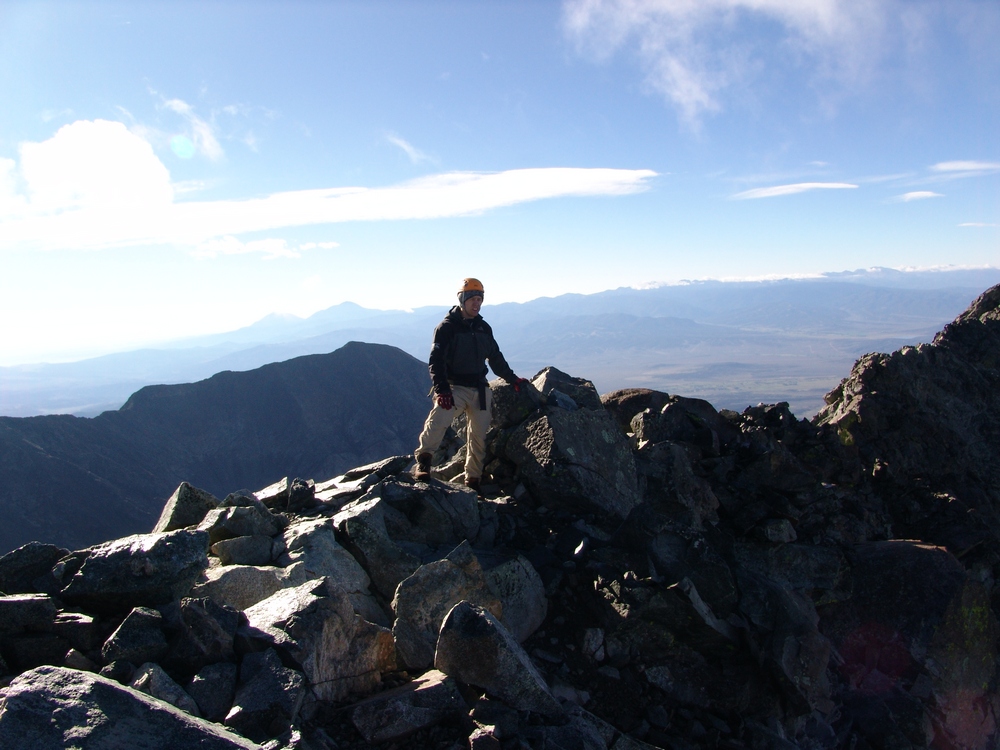
Dave tops out on Little Bear's summit.
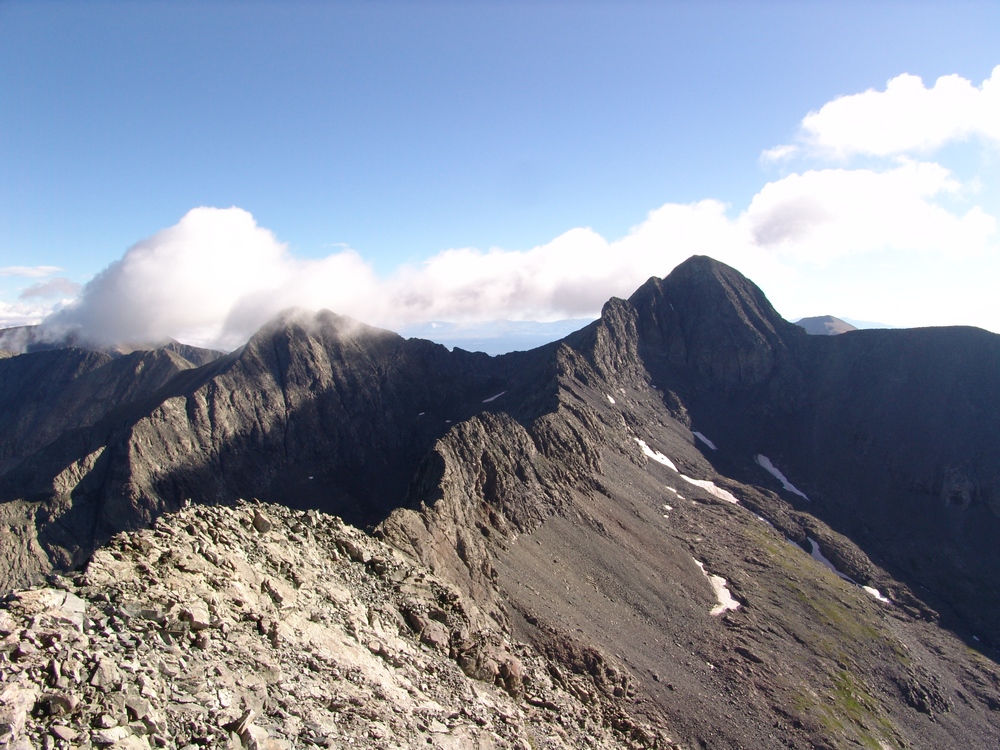
A great view of the connecting ridge between Little Bear and Blanca Peak. The traverse between Blanca and Little Bear is considered one of the most difficult in the State of Colorado.
A 3600 panoramic photo from the summit of Little Bear Peak - click on photo for full resolution version.
We also got to witness the SAR extraction of the injured climber.
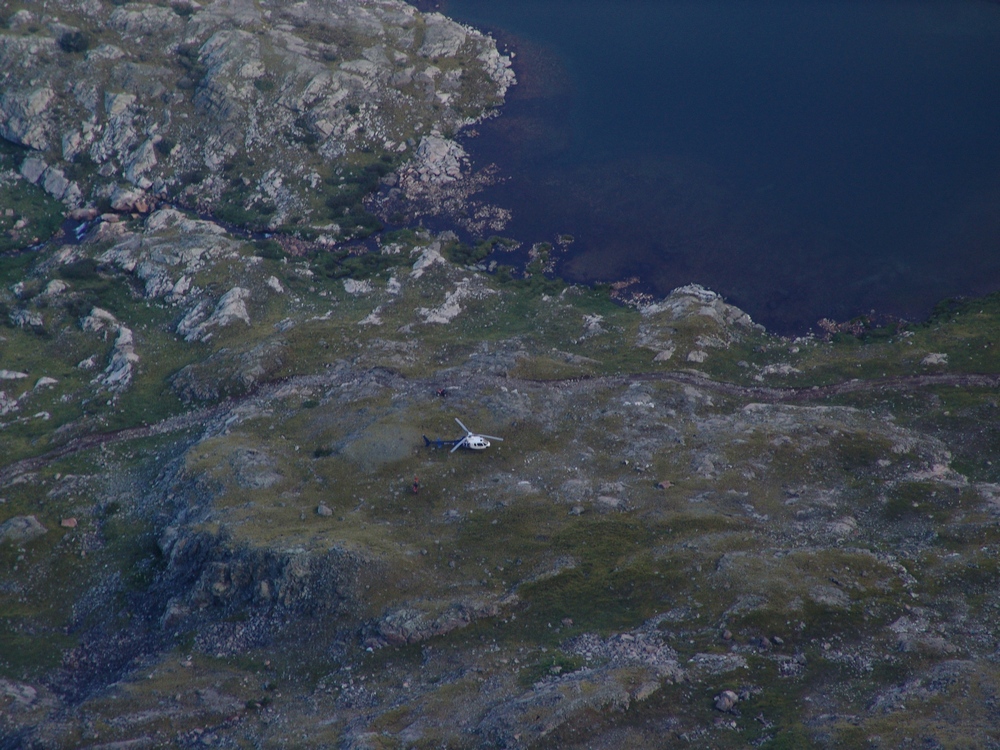
Flight for Life rescues an injured climber.
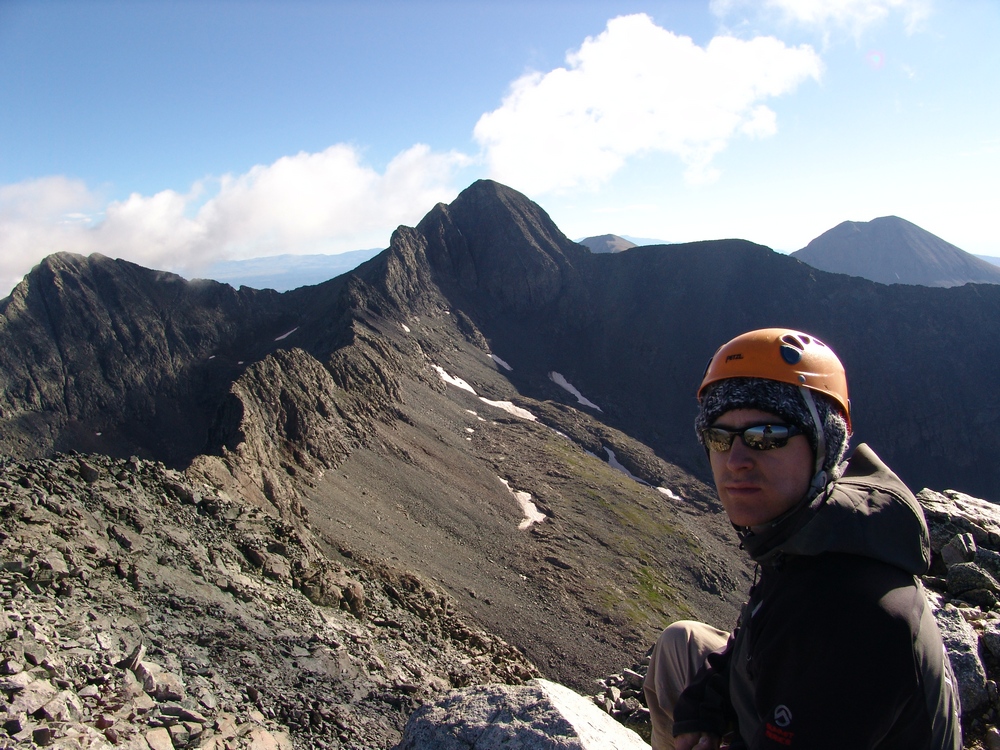
Dave on the summit of Little Bear.
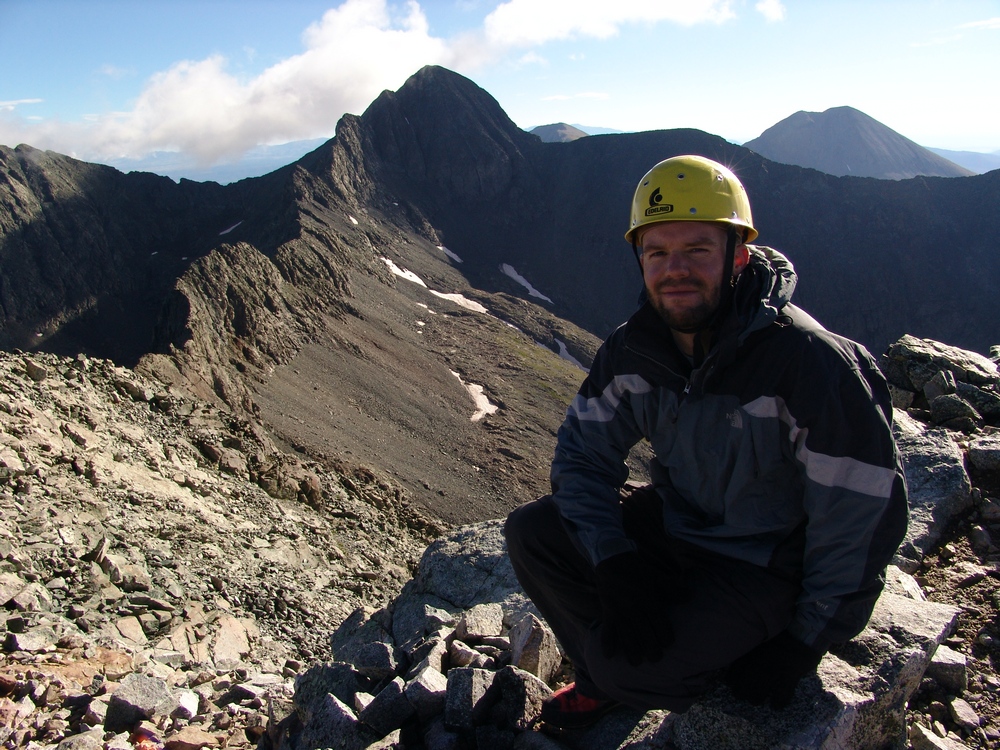
Matt Payne on the summit of Little Bear.
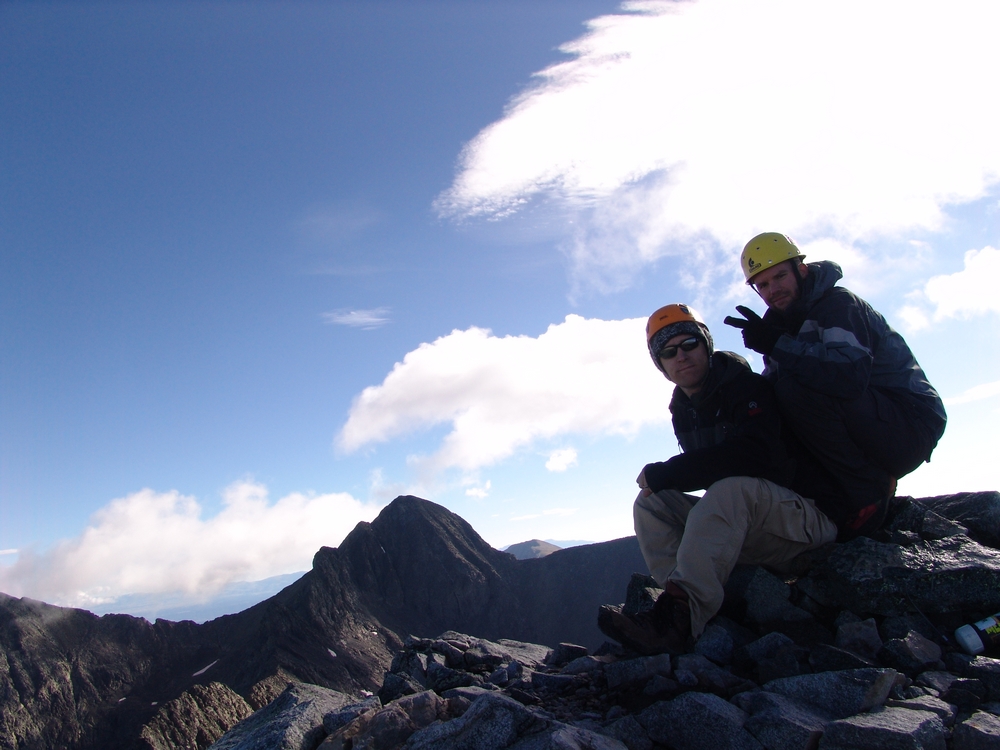
Matt and Dave on the summit - using a self-timer.
One of the neat things you can see from the summit of Little Bear is the crop circles down in the San Luis Valley.
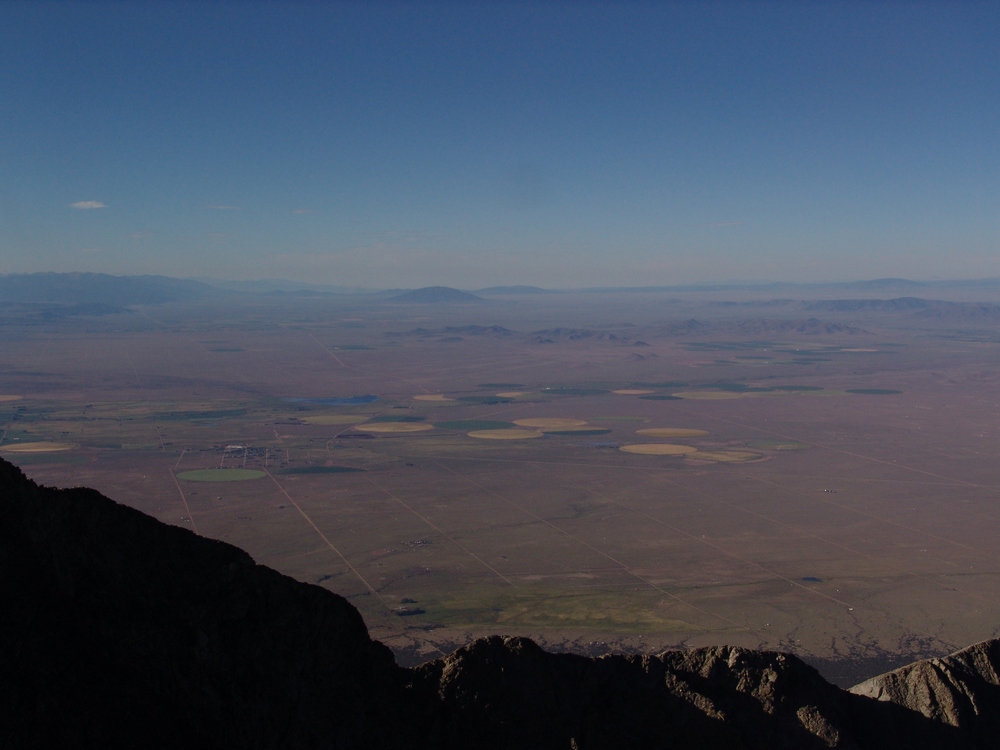
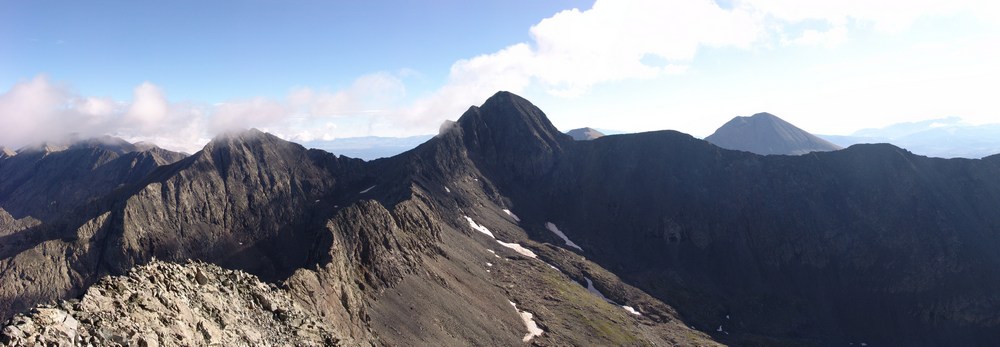
Clouds roll over Ellingwood Point and Blanca Peak.
A group of two climbers joined us on top for a short time and we all agreed to down climb together, as to avoid rockfall.
The wind was quite chilly on the summit, so we departed after spending no more than 30 minutes on top. The four of us made our way down to the start of the roped section of the Hourglass. I was concerned with how this was going to work, given the steepness and wetness of the rock here. Our plan was to use the rope as a handhold and slowly descend while facing the rock, one at a time. The process turned out to be quite the success, as none of us slipped or had difficulty making our way down the roped and scary section.
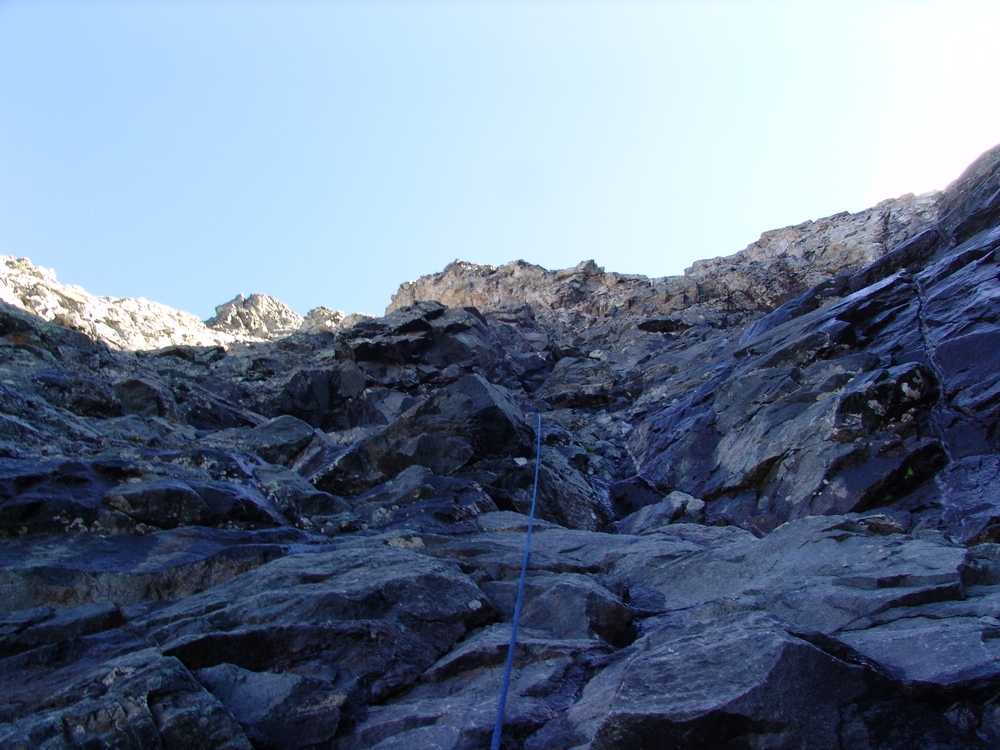
Looking up at the fixed rope in the Hourglass
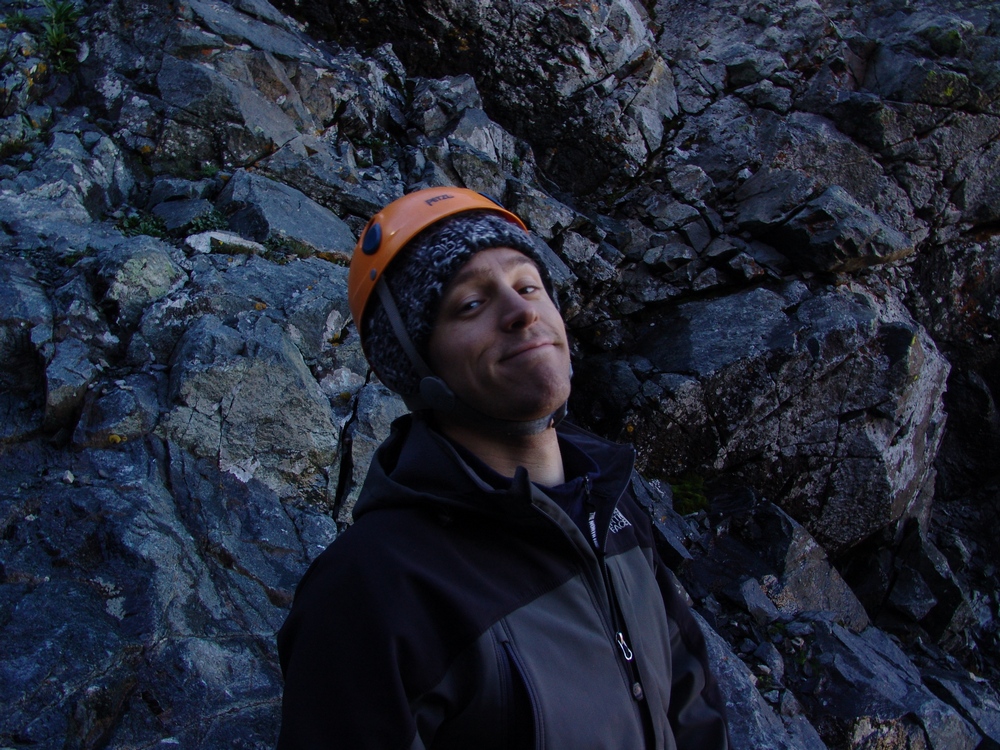
Dave is ready to downclimb the Hourglass.
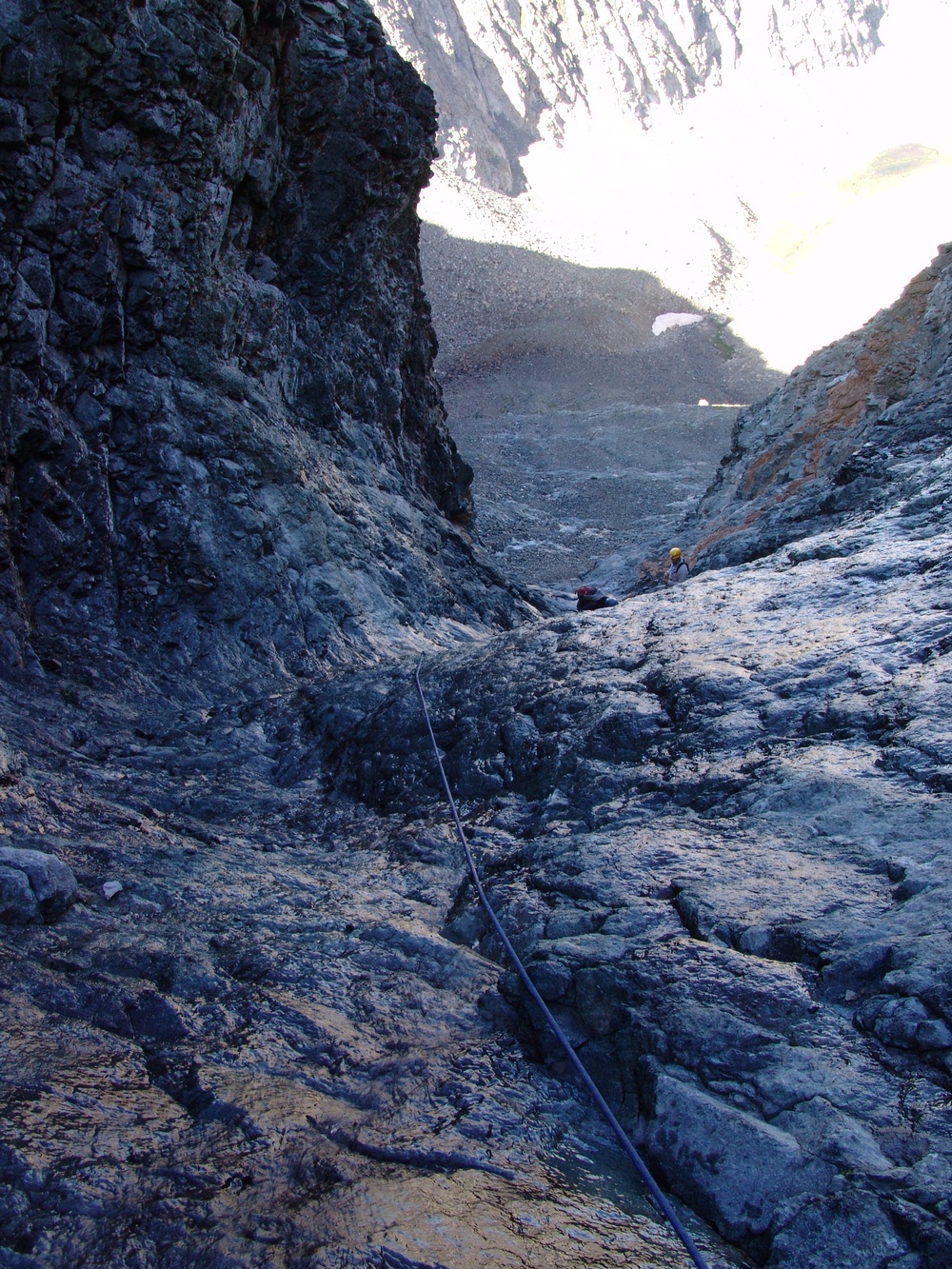
Looking down the Hourglass and the wet terrain.
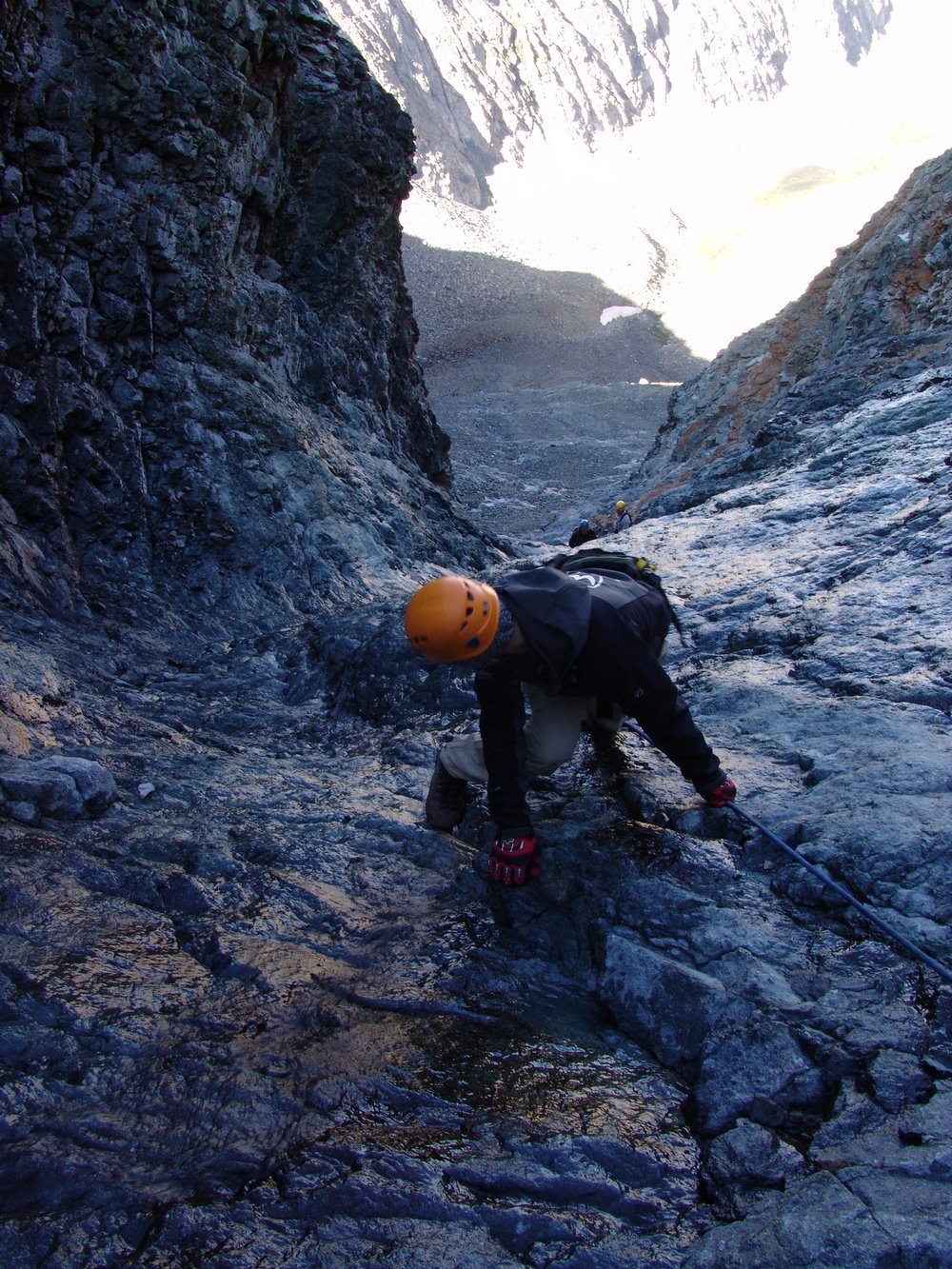
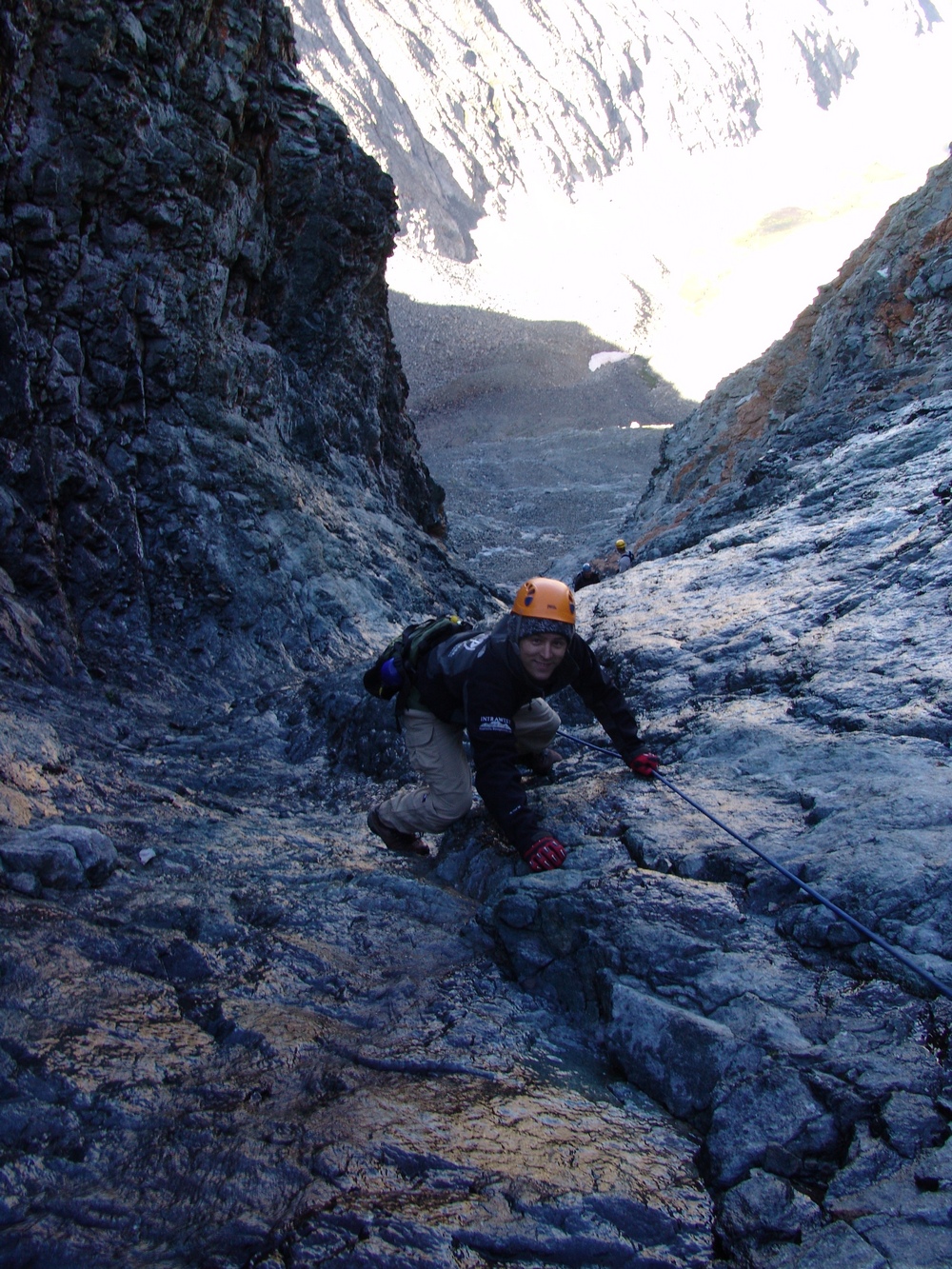
Dave starts down the Hourglass.
After successfully making it down through the Hourglass, the four of us headed back over below the ridge of Little Bear. We all decided to go up and over the ridge instead of below, which enabled us to get some great views of Lake Como and the surrounding area, including Ellingwood Point.
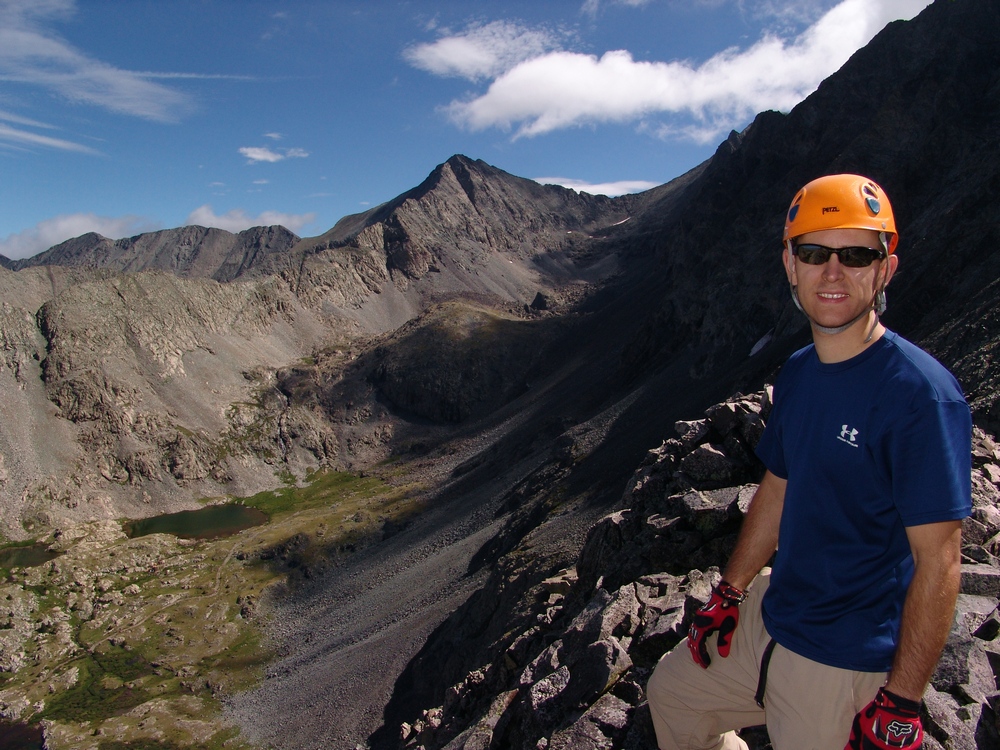
Ellingwood Point sits at the top of the Lake Como basin.
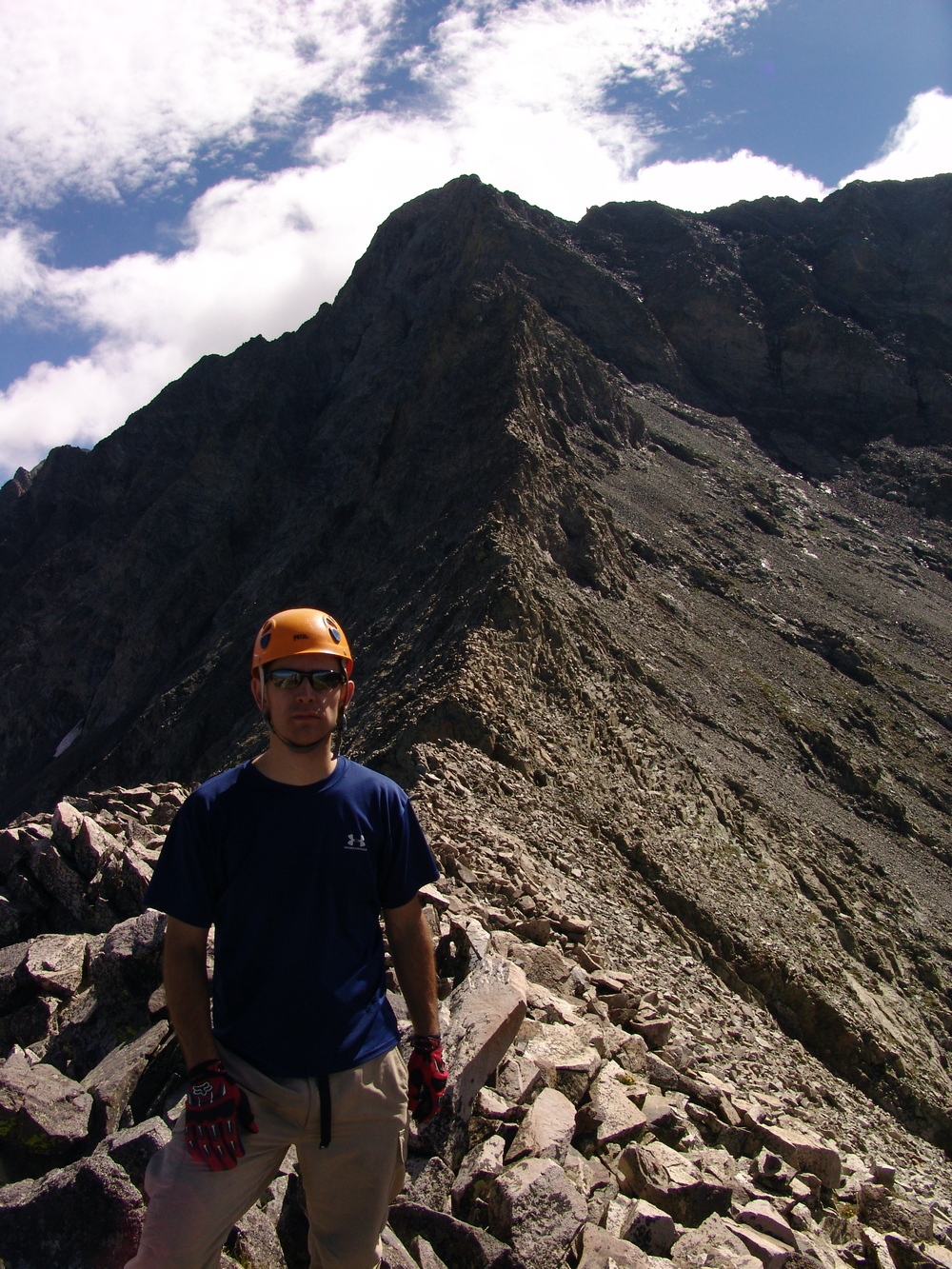
Dave with Little Bear in the background.
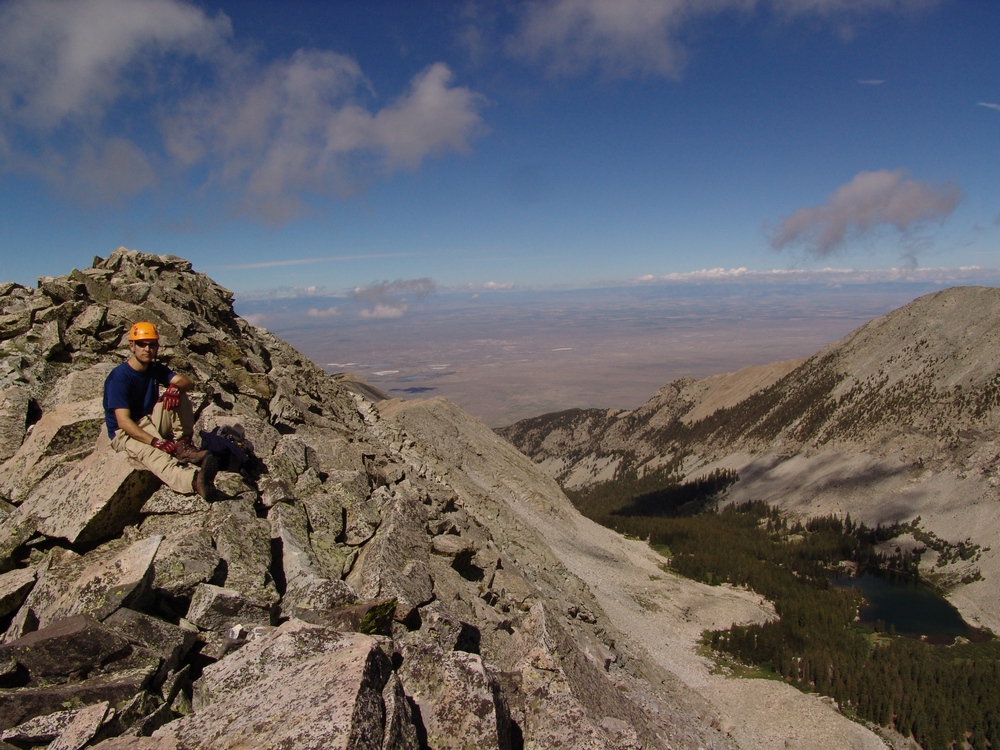
Dave and Lake Como.

Little Bear and the Lake Como basin.

Little Bear splits two valleys.
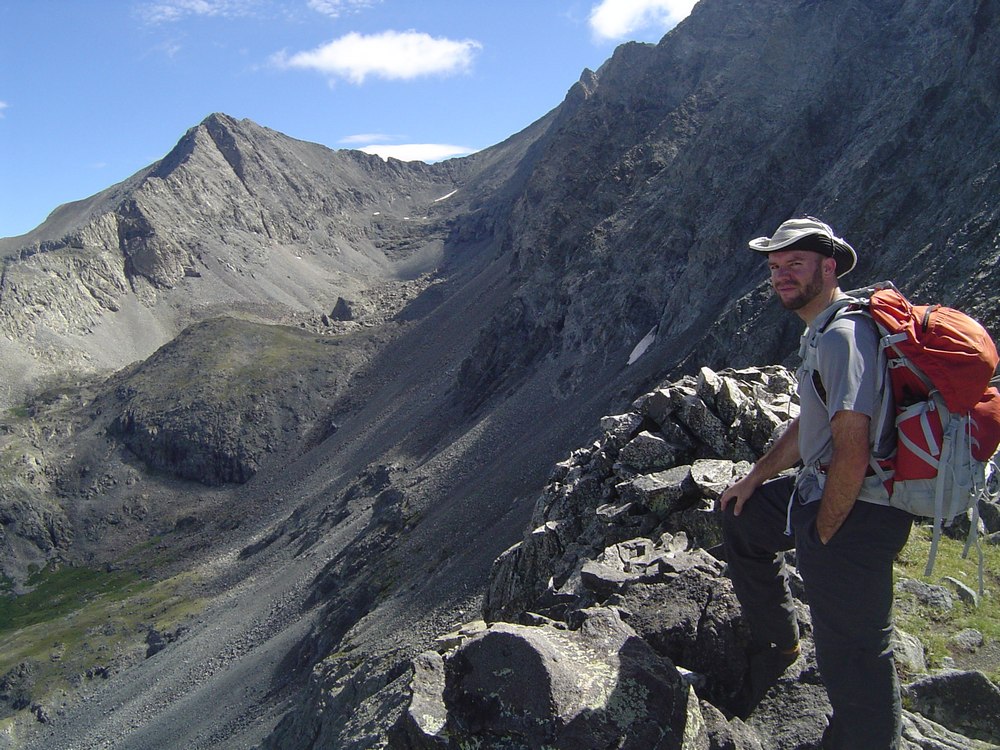
Matt on the Little Bear ridge.
We made it back safely to our campsite and quickly packed up and drove down. Dave's Jeep once again performed quite well over the obstacles going down.
Overall, I would rate Little Bear as one of the most difficult 14ers. The exposure and risk at the Hourglass, coupled with the rockfall potential, make Little Bear very dangerous and not for the beginner climber. I would highly recommend climbing helmets and would even advocate the use of rope and a harness with belay devices for the down-climb. If you're in need of a good climbing helmet, this one from Backcountry.com looks go be a nice buy.
Update on the injured climber we saw on Ellingwood Point: I posted what we had witnessed and discussed with the SAR team on a thread on 14ers.com, which erupted into a lively discussion about hiking with people that have pre-existing medical conditions. The consensus from that discussion was that it is very much the responsibility of someone with a pre-existing medical condition to disclose that condition to their fellow hikers before embarking on a hike, especially if that medical condition may place you or your partners in serious danger, such as what happened in this case. Unfortunately, Elisabeth did not respond well to that discussion on 14ers.com and basically called the whole forum a bunch of expletives. Later on, she sent me a private message requesting that I delete that thread because of the stress it had caused her and because she was unable to obtain employment because of the content of the thread. She claimed that she was being singled out becuase of her condition; however, my guess is that employers saw how immature her response to the whole situation was and did not want to hire someone with such a way of interacting with others. Anyways, I refused to delete the thread and she threatened to sue me for libel and slander because I had implied that her injury was a direct result of her pre-existing medical condition (which of course is not what I had typed at all). I had suggested that it was possible that her epilepsy could cause her to be weaker physically and that would cause you to have a higher probability of falling and hurting yourself. Anyways, I eventually had Bill at 14ers.com delete the thread but I still have the discussion saved as a .pdf if anyone is interested in reading it. Bottom line, I believe a lot can be learned from the mistakes of others, and we should embrace the opportunity to learn at all times.



